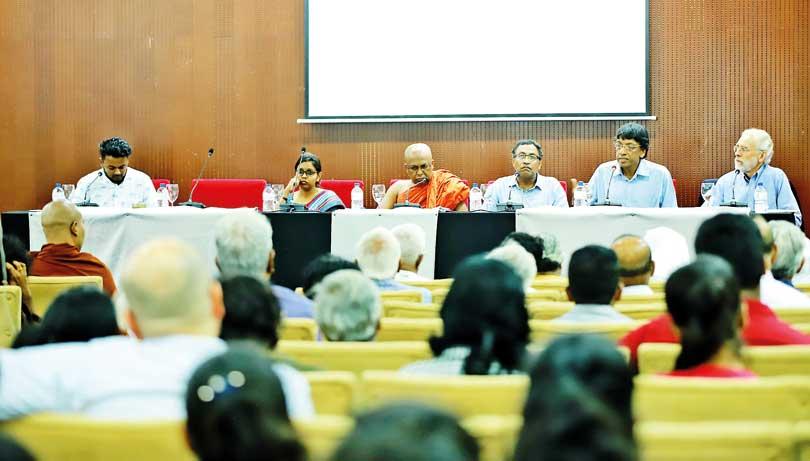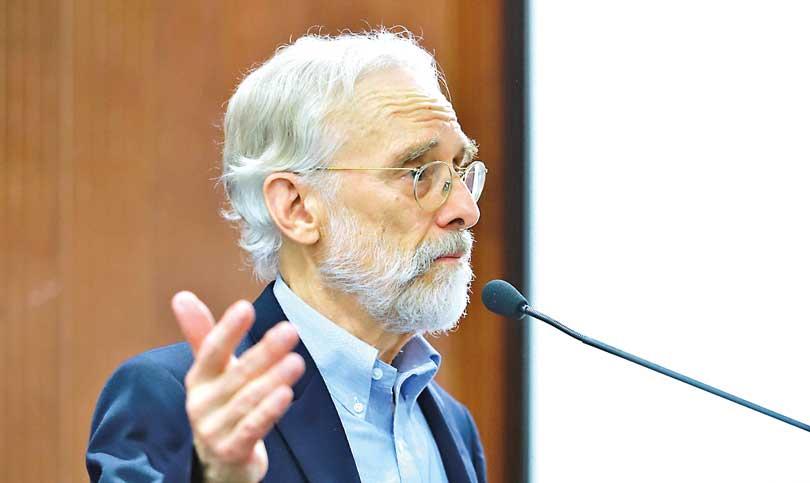Reply To:
Name - Reply Comment

 A little over a decade ago, Sri Lanka ended a bloody civil war and yet, questions on the country’s approach to justice remain unanswered. As a result, there is a continuing cycle of hate, anger and pain. There is a dire need for change in the nation. Restorative justice – which centres on social cohesion, resilience, inclusion and interdependence – can perhaps work to put into place a new set of values, practices and understanding that allows for a change in a largely-failing justice system.
A little over a decade ago, Sri Lanka ended a bloody civil war and yet, questions on the country’s approach to justice remain unanswered. As a result, there is a continuing cycle of hate, anger and pain. There is a dire need for change in the nation. Restorative justice – which centres on social cohesion, resilience, inclusion and interdependence – can perhaps work to put into place a new set of values, practices and understanding that allows for a change in a largely-failing justice system.
A seminar organised by Initiatives of Change Lanka (IofC) on February 3 at the BMICH discussed the role restorative justice could play in restoring and healing wounded people to create a more just society. The event’s keynote speaker was Barry Hart, Professor of Psychosocial Trauma, Identity, Dignity and Peace-building of Eastern Mennonite University, USA.
Prof. Hart began by pointing out that in the traditional justice system, justice was defined in a way that shifted the focus from the victim to the perpetrator and the punishment. In contrast, restorative justice considers the victim, the offender and the community thereby emphasising a justice that is relational.
The philosophical concepts of justice such as right relationship, harmony, natural or universal law are foundational to restorative justice. “The heart of the matter is a right relationship,” noted Prof. Hart, adding that it was vital that people understood the relationship an individual shared with the community. “They need to know that there’s a relationship of dependency with the community and vice versa, and the breaking of the law is a breaking of this bond,” he said. While people are inherently different, working collectively is essential to build peace, founded on the idea that each person completes the other’s humanity.
Peace-building is a long and continuous process that involves essential aspects such as psychosocial trauma and healing, education, justice, security, leadership, religion/spirituality, identity/worldview, humanitarian assistance, development and space. Prof. Hart noted that in a post-war context, the focus was often on tangible issues like developing infrastructure and the economy, while neglecting intangible issues such as identity and psychological trauma. To establish truth and to restore broken bonds, there needs to be an acknowledgement of what happened. “Both the individual and collective body hold trauma for generations and by neglecting to acknowledge and address both tangible and intangible elements, the problem will only persist. People are not just facts, but feelings as well,”
Prof. Hart said.
Power plays a pivotal role in peace-building and must be used responsibly. Prof. Hart drew on the words of US civil rights leader Martin Luther King Jr. to demonstrate its purpose: “Power without love is reckless and abusive. Power properly understood is the ability to achieve a purpose. It’s the strength required to bring about social, political or economic change. Power at its best is love implementing the demands of justice.”
He emphasised that everybody needed to be heard – the offender, the victim and the community. “Restorative justice seeks to balance the scales of justice by acknowledging the harm done to the person, addressing the needs and obligations of the person who caused the harm and making right the wrongs using collaborative models that empower all involved,” he said, adding that this was a life-affirming approach that used power in a constructive manner.
Restorative justice helps transform lives, be it in criminal matters or any other aspect in society. In the sphere of education, the establishing of a value-based system is important. Prof. Hart recommended adopting a method of restorative discipline rather than punitive discipline. He encouraged people to build on practices already in place instead of re-inventing methods. He revealed that prisoners to whom restorative methods were introduced transformed their lives for the better. By dealing with hurt, there is a possibility of breaking the vicious cycle of hurt.
The panel discussion that followed addressed how restorative justice could be applied in Sri Lanka, taking into consideration current issues in society. Moderated by Suchith Abeyewickreme of IofC, the panel comprised National Peace Council head Dr. Jehan Perera, senior lecturer and Director of the Legal Research Unit at the Colombo Law Faculty, Sarveswaran Arulanantham, Director of Walpola Rahula Institute, head of the Department of History at Kelaniya University, Ven. Galkande Dhammananda Thera and lawyer cum activist, Lakmali Hemachandra.

Keynote Speaker Barry Hart, Professor of Psychosocial Trauma, Identity, Dignity and Peace-building of Eastern Mennonite University, USA
Describing the discussion as timely, Dr. Perera focused on two recent issues – the singing of the national anthem on Independence Day and the statement made by the President that thousands of missing persons were dead. Dr. Perera said the Constitution provided for a parity of languages but there were those who considered that the national anthem should be sung in the language of the majority. “The country is at crossroads. Will we become a plural society, where there is equality between the communities?” he asked. He also voiced concerns over the President’s statement emphasising the lack of closure for affected families as there was no information as to what actually happened to them. He pointed out that the issue lied in accountability and punishment. Dr. Perera said there was reluctance to pursue wrongs committed in the past, especially those related to war. Using the example of how the Truth and Reconciliation Commission in South Africa gave amnesty and forgiveness to those who confessed and repented, he suggested that restorative justice could perhaps be used as the way forward.
“We have a deeply-wounded society. The pain felt by both sides is the same, one is not greater than the other,” Ven. Dhammananda Thera said. War and victory were not things that should be celebrated, instead there must be lamentation over what happened, he said, emphasising the need for shared responsibility. Reflecting on the model set by King Ashoka in his response to war, he said the kind of language needed to move forward was one where people’s pain was acknowledged and understood. He expressed that the Buddhist approach to justice was similar to restorative justice and that these teachings needed to be translated into practical models to move forward.
Arulanantham noted an increased polarisation of the communities where identity was rooted in ethnicity instead of a collective Sri Lankan identity. He said inconsistent national policies caused problems as seen with the national anthem. For people to have faith in a system, consistency is needed. He called for a change in the existing system, pointing out the flaws in the criminal justice system, using the Prevention of Terrorism Act as an example where people languish for years in prison.
Power plays an important role in justice and should be a crucial part of the discussion. Drawing on different outcomes seen in South Africa and Sri Lanka, Hemachandra said they were those who won who decided how justice was achieved. She added that justice should be understood in terms of the injustice that occurred. “How do you bring justice in terms of power when someone powerful has committed the crime?” she asked, adding that this was an important problem facing the country.
She identified that certain people and communities were denied of justice and reconciliation and that their struggle was hampered by existing structures of inequality and power. The disenfranchisement of estate workers was one of the first acts of injustice after independence, said Hemachandra, who works extensively with the plantation sector. Although promised by the State, their struggle for a daily wage of a mere Rs.1,000 has yet to be realised. She also questioned if restorative justice could bring justice in cases of domestic abuse and issues of ethnic identity. “Until certain forms of injustice and power are dismantled, and only when the powerless become powerful or are empowered, will justice have meaning,” Hemachandra emphasised.
More than a decade has passed since the end of the war, but Sri Lanka has yet to address the underlying issues of ethnic and religious tensions and failings in the current justice and education systems. To move forward as a cohesive and inclusive nation, these issues need to be addressed. Perhaps, restorative justice, whose focus is on restoring all involved without condemning them, will help pave the way forward for this nation.